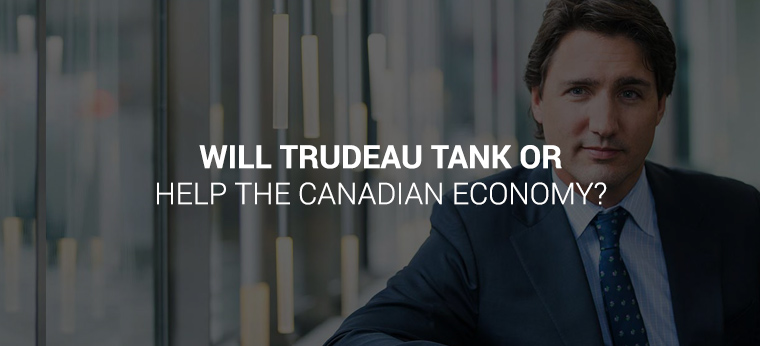
The liberals have taken control of the federal government once again. Justin Trudeau recently became the second youngest Canadian Prime Minister, following in the footsteps of his father, who once held this office. Some believe the people voted liberal simply to move the conservatives out of office, as they have held power for almost ten years. Others feel the change was the result of a Conservative platform that was lacking in new ideas. Regardless of why one believes Trudeau won, everyone is wondering what this means for the canadian economy.
The Positive Aspects on Canadian Economy
Middle class families are expected to benefit from the change in power, thanks to the Canada Child Benefit. This program replaces the Universal Child Care Benefit and will exclude wealthy families. The average middle class family of four should see $2,500 more very year, and this money will be tax free. In addition, Trudeau and his party look to make parental benefits more flexible, to better meet the needs of these families.
Looser financial policy is expected as a result of Trudeau’s win, and many believe this will benefit the canadian economy. The loonie is expected to weaken before it bounces back next year, and the overall policy is believed to help support the currency, doing so by minimizing the risk of additional interest rate cuts. Canada’s credibility won’t be diminished as a result of the loosening of the country’s fiscal stance.
The liberals, under Trudeau, will increase the Canada Student Grant to $3,000 for those students attending school full time and $1,800 for students who go to school part time. This is the maximum a child may get under this program, yet they also plan to expand the program, by increasing the income thresholds. This will allow more students to attend school while decreasing the amount of money they will owe to do so.
The Negative Aspects on Canadian Economy
Wealthy families will pay more in taxes under Trudeau. Anyone making more than $200,000 year will now be hit with a 33 percent tax rate, and this is a four percent increase over what they are currently paying. The party states this increase is necessary, as the canada economy has shifted over the years., and the income growth pace has slowed. Middle class families will benefit, those making under $89,401 a year, yet many feel this move will hurt the economy over the long run.
Retirees and high income earners will no longer be allowed to put $10,000 away in their TFSA. In 2016, the liberals will decrease this amount to $5,500, indexed to inflation. This program was good for those who chose to save money, and any funds that have already been deposited will remain safe. This does suggest that people may save less, unless they know how to maximize the use of tax shelters.
Textbook tax credits are being eliminated under the liberals, and this may hurt students who wish to pursue higher education. The liberals have a plan in place to counteract this, but it won’t help all students. Individuals will not be required to pay on their student loans until their income hits $25,000 a year, but those students who pay as they go for their education won’t benefit from this change being enacted.
Only time will tell how these changes actually impact the Canadian economy. Overall, many feel the move to Trudeau will be of benefit, but there are some who disagree. Furthermore, these are only a few of the changes that are being made. For example, the liberals have also promised to spend the current budget surplus, yet most believe this won’t affect the overall economy.
One thing is guaranteed, however. People will be watching to see what effect the changes will have in their own life, more than they will how the changes will impact the economy as a whole. When the changes hit the family budget, this is when people take notice.
